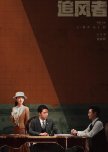This review may contain spoilers
A Good Espinoza Drama set in Republic era with story that totally fits its Name (War of Faith)
My final rating would have been 8.5, but given its current rating of 8.3, I decided to round it up to 9.
"War of Faith" weaves a compelling narrative around three dynamic characters - Wei Ruo Lai, Shen Tu Nan, and Shen Jin Zhen - set against the backdrop of Shanghai's turbulent political and financial landscape of the 1930s, impacting the entirety of China.
The Premise:
The story begins with Wei Ruo Lai, a young man from a rural village who moves to the city hoping to leverage his mathematical skills and eidetic memory to improve his life. He secures a position at the Central Bank, which is under the government's purview at the time, working directly under his idol and mentor, Shen Tu Nan, the bank director. This job also leads him to meet Shen Jin Zhen, an engineer working at an arsenal factory and Shen Tu Nan's sister.
The Main Story Line:
Both Shen siblings are deeply committed to their principles - the Nationalist Party (KMT) and the Communist Party - and are dedicated to improving their country through their beliefs and expertise. Shen Tu Nan strongly believes financial reform within the republic, while Shen Jin Zhen believes that only a complete governmental overhaul can truly better the nation. Although Wei Ruo Lai is fully aware of the strong convictions held by both siblings, he particularly admires his mentor Shen Tu Nan and wholeheartedly dedicates to his vision of financial unification. However, Wei Ruo Lai's idealism is shattered when he discovers rampant corruption within the republic at devastating personal cost, leading him to lose faith in both Shen Tu Nan and the KMT government. This disillusionment forces him to escape the city with the assistance of Shen Jin Zhen. In a rural setting, Wei Ruo Lai begins to understand and adopt communist ideals, gradually engaging in efforts for financial unity. This path eventually leads him to financial confrontation with his former mentor, Shen Tu Nan.
Positives:
1) The Excellent and compelling characters (Main and Supporting) with satisfactory arcs
2)One of the best Anti-Hero story arc (Lin Qiao Song) in recent times that raises the strakes
3) Some Historic Moments/ Details laid throughout storyline that shed some light such as Shanghai Bombing, Anti-Japanese moment, Long March.
4)The Production and set piece looks high quality are excellent, i recommend to watch it on TV or much bigger screens.
5)The Powerhouse performance from wang yibo, wang yang and li qin.
Negatives:
1)Phasing n narratives disjoint Issues particularly second half of the story.
2)A very to the nose Propaganda in the last 7 episodes.
3)Irritating how villains survive sometimes to the point they survive after enduring 2 bomb blast in one day.
"War of Faith" weaves a compelling narrative around three dynamic characters - Wei Ruo Lai, Shen Tu Nan, and Shen Jin Zhen - set against the backdrop of Shanghai's turbulent political and financial landscape of the 1930s, impacting the entirety of China.
The Premise:
The story begins with Wei Ruo Lai, a young man from a rural village who moves to the city hoping to leverage his mathematical skills and eidetic memory to improve his life. He secures a position at the Central Bank, which is under the government's purview at the time, working directly under his idol and mentor, Shen Tu Nan, the bank director. This job also leads him to meet Shen Jin Zhen, an engineer working at an arsenal factory and Shen Tu Nan's sister.
The Main Story Line:
Both Shen siblings are deeply committed to their principles - the Nationalist Party (KMT) and the Communist Party - and are dedicated to improving their country through their beliefs and expertise. Shen Tu Nan strongly believes financial reform within the republic, while Shen Jin Zhen believes that only a complete governmental overhaul can truly better the nation. Although Wei Ruo Lai is fully aware of the strong convictions held by both siblings, he particularly admires his mentor Shen Tu Nan and wholeheartedly dedicates to his vision of financial unification. However, Wei Ruo Lai's idealism is shattered when he discovers rampant corruption within the republic at devastating personal cost, leading him to lose faith in both Shen Tu Nan and the KMT government. This disillusionment forces him to escape the city with the assistance of Shen Jin Zhen. In a rural setting, Wei Ruo Lai begins to understand and adopt communist ideals, gradually engaging in efforts for financial unity. This path eventually leads him to financial confrontation with his former mentor, Shen Tu Nan.
Positives:
1) The Excellent and compelling characters (Main and Supporting) with satisfactory arcs
2)One of the best Anti-Hero story arc (Lin Qiao Song) in recent times that raises the strakes
3) Some Historic Moments/ Details laid throughout storyline that shed some light such as Shanghai Bombing, Anti-Japanese moment, Long March.
4)The Production and set piece looks high quality are excellent, i recommend to watch it on TV or much bigger screens.
5)The Powerhouse performance from wang yibo, wang yang and li qin.
Negatives:
1)Phasing n narratives disjoint Issues particularly second half of the story.
2)A very to the nose Propaganda in the last 7 episodes.
3)Irritating how villains survive sometimes to the point they survive after enduring 2 bomb blast in one day.
Was this review helpful to you?






